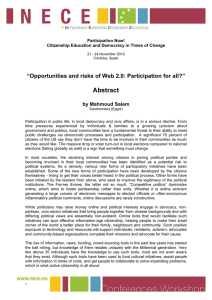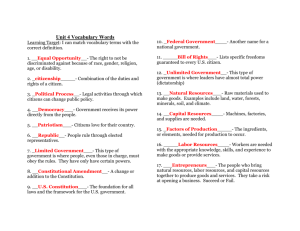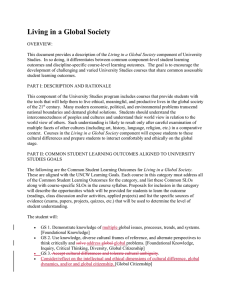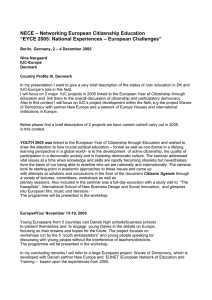Document 13157250
advertisement
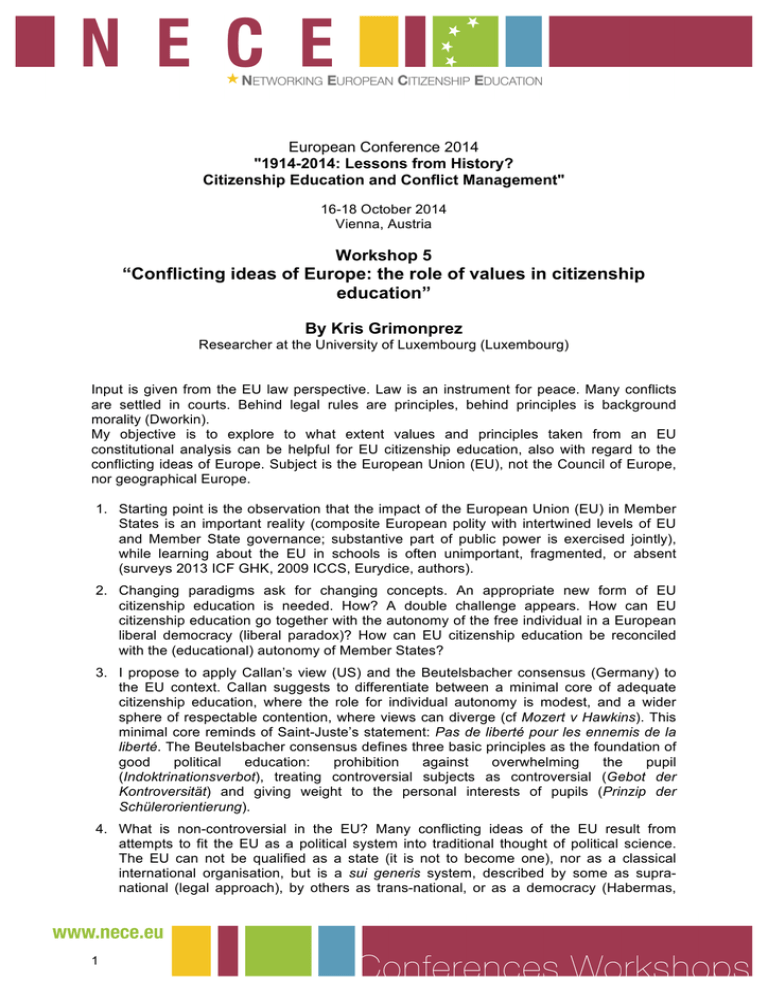
European Conference 2014 "1914-2014: Lessons from History? Citizenship Education and Conflict Management" 16-18 October 2014 Vienna, Austria Workshop 5 “Conflicting ideas of Europe: the role of values in citizenship education” By Kris Grimonprez Researcher at the University of Luxembourg (Luxembourg) Input is given from the EU law perspective. Law is an instrument for peace. Many conflicts are settled in courts. Behind legal rules are principles, behind principles is background morality (Dworkin). My objective is to explore to what extent values and principles taken from an EU constitutional analysis can be helpful for EU citizenship education, also with regard to the conflicting ideas of Europe. Subject is the European Union (EU), not the Council of Europe, nor geographical Europe. 1. Starting point is the observation that the impact of the European Union (EU) in Member States is an important reality (composite European polity with intertwined levels of EU and Member State governance; substantive part of public power is exercised jointly), while learning about the EU in schools is often unimportant, fragmented, or absent (surveys 2013 ICF GHK, 2009 ICCS, Eurydice, authors). 2. Changing paradigms ask for changing concepts. An appropriate new form of EU citizenship education is needed. How? A double challenge appears. How can EU citizenship education go together with the autonomy of the free individual in a European liberal democracy (liberal paradox)? How can EU citizenship education be reconciled with the (educational) autonomy of Member States? 3. I propose to apply Callan’s view (US) and the Beutelsbacher consensus (Germany) to the EU context. Callan suggests to differentiate between a minimal core of adequate citizenship education, where the role for individual autonomy is modest, and a wider sphere of respectable contention, where views can diverge (cf Mozert v Hawkins). This minimal core reminds of Saint-Juste’s statement: Pas de liberté pour les ennemis de la liberté. The Beutelsbacher consensus defines three basic principles as the foundation of good political education: prohibition against overwhelming the pupil (Indoktrinationsverbot), treating controversial subjects as controversial (Gebot der Kontroversität) and giving weight to the personal interests of pupils (Prinzip der Schülerorientierung). 4. What is non-controversial in the EU? Many conflicting ideas of the EU result from attempts to fit the EU as a political system into traditional thought of political science. The EU can not be qualified as a state (it is not to become one), nor as a classical international organisation, but is a sui generis system, described by some as supranational (legal approach), by others as trans-national, or as a democracy (Habermas, 1 Nicolaïdis). I propose to leave the qualification debate aside. Acknowledging uncertainties as to how to name the animal, it is certain that the animal is there, and that it even has growing importance. Crucial is rather to have an insight in the fundamentals of this unique political system. 5. Where to find better the consensus, the foundations for a minimal hard core for citizenship education (in general) than in constitutions? Constitutions are not neutral. They make choices for values and principles. Aristotle insisted on ‘the education of citizens in the spirit of their constitution. There is no profit in the best of laws … if the citizens themselves have not been attuned, by the force of habit and the influence of teaching, to the right constitutional temper’. Education in the spirit of the constitutional culture is not to be considered as indoctrination. It is even a constitutional responsibility. Democracy, a constitutional choice, requires education (Dewey). 6. To a large extent, the European Treaties function as the constitution of the EU. Signed by all 28 Member States, they express the EU ‘constitutional’ consensus (a functional constitution). The Lisbon Treaties, consisting of the Treaty on European Union (TEU), the Treaty on the Functioning of the European Union (TFEU) and the Charter of the Fundamental Rights of the EU1, are the ‘Grundnorm’, primary EU law, top of the EU pyramidal hierarchy of norms (applying Kelsen). They are the inner sphere of the EU, where there is a surprising stability and order (Van Middelaar). The EU is a constitutional order, ordering the plurality of 28 Member States who work together towards common objectives. In line with Aristotle, education in the spirit of this EU (functional) constitution is needed. It can be seen as a constitutional responsibility of Member States (analogue Craig). 7. In the three ‘constitutional’ documents (TEU, TFEU, Charter), the following values, objectives and principles are central (I call them hereinafter ‘foundational values, objectives and principles’). Part of primary EU law, they belong to the consensual core of the EU (and awareness of them can thus provide a minimal hard core for EU citizenship education, to discuss): A. Foundational values ‘The Union is founded on the values of respect for human dignity, freedom, democracy, equality, the rule of law and respect for human rights, including the rights of persons belonging to minorities. These values are common to the Member States in a society in which pluralism, non-discrimination, tolerance, justice, solidarity and equality between women and men prevail.’ (art. 2 TEU2) B. Foundational objectives (the EU as a Project) ‘The Union’s aim is to promote peace, its values and the well-being of its peoples.’ ‘The Union shall offer its citizens an area of freedom, security and justice without internal frontiers ‘ ‘The Union shall establish an internal market’ ‘It shall combat social exclusion and discrimination, and shall promote social justice and protection’ (extracts of art. 3 TEU) § § § § 1 The Charter is binding for EU institutions as well as for Member States implementing Union law (art. 51). This article contains a catalogue of values for the EU. Compare Buchenau K, ‘Den europäischen Wertekatalog gibt es nicht!’ (20/1/2010) <http://www.bpb.de/internationales/europa/europa-kontrovers/38050/standpunkt-klausbuchenau?p=all>; as well as Stratenschulte ED, ‘Die Werteordnung der EU und ihre Grundlage: Eine klare Sache?’ http://www.bpb.de/internationales/europa/europa-kontrovers/38039/einleitung?p=all (Access 3/11/2014). 2 2 C. Foundational principles democracy principles of conferral, subsidiarity, proportionality, loyal cooperation, respect for national identities, mutual respect, mutual recognition (principles ordering pluralism) principle of non-discrimination on grounds of nationality principle of an open market economy with free competition (fundamental freedoms: free movement of goods, etc.) free movement of EU citizens principle of equal opportunities and equal treatment of men and women principle of sustainable development fundamental rights (Charter, general principles of Union law as guaranteed by the ECHR and also resulting from the constitutional traditions common to the Member States) … § § § § § § § § § § 1. How far does the minimal consensual EU core reach and from where starts the sphere of respectable contention (applying Callan)? Some principles are absolute and permit no derogation, as the prohibition of torture (even in case of public emergency threatening the life of the nation, or fight against terrorism and organised crime, cf case law ECtHR, EU Charter Explanations). Equally unacceptable, of course, is to defend human indignity, dictatorship, intolerance, … A minimal consensual core in the EU liberal democratic society can and must be the subject of EU and Member States’ citizenship education. But at least as crucial is to build an open sphere of respectable contention around this minimal core, formed by debate, critical reflection, and aiming at reasonable individual judgment. The interpretation and scope of foundational values, objectives and principles are not always clear. Their limitations or balancing among them, give rise to controversies (even if the Treaties provide for guidance in this respect, see for instance art. 52 Charter). Thus, many EU systemic principles provide food for discussion, and offer excellent occasions to apply the Beutelsbacher consensus principles. As a minimum, EU foundational values, objectives and principles offer guidance, and permissible vocabulary and arguments (cf Müller), as acceptable weapons for conflict management in a pluralistic society. 2. How can citizenship education help solve or prevent conflicts and frictions at the local, national and transnational level? (conference question) We need EU citizenship education about the EU as a political system, with a double aim: first, Mission (awareness of EU foundational values, objectives and principles may contribute to a better European society) and, second, Mündigkeit of citizens in a European democratic society (cf Sander). The need to empower citizens cannot be confined to national democracies. ‘Democracy is not about states. Democracy is about the exercise of public power -- and the Union exercises a huge amount of public power.’ (Weiler) Young citizens in schools have to be explained the groundrules of the EU game. And then, they can play with them: in critical discussions in classrooms, in democratic citizenship in society, and in unavoidable conflicts in daily and political life in the Member States participating in the EU. 3. In this perspective, EU constitution and EU education can mutually influence one another. The EU constitution influences aims and content for EU citizenship education and, as a result, education influences the interpretation and the dynamic life of the EU constitution (future Treaties, referenda, elections, etc., because the EU is not only a Project and a Product, it is also a Process). 3 4. How to pass from theory to practice? EU foundational values, objectives and principles are no vague abstract academic truths, but they are often decisive in concrete conflict resolution, as appears from case law of the European Court of Justice. Some individual cases before this court provide (in my experience) an excellent tool for EU citizenship education, as a basis for attractive stories narrated in the classroom. These stories in EU citizenship education present daily life situations and European dilemmas in concrete conflicts between citizens, EU Member States, institutions, or even between continents (EU versus US). 5. The stories waken up interest of pupils, stimulate to understand different parties’ standpoints and often lead to lively debates when the foundational principles at stake are recognized. In full respect of the three Beutelsbacher consensus principles, this tool of EU citizenship education allows searching for the minimal consensus and stimulates formation of an independent judgment. Some examples of stories: the story of the student in love, the president and the statue, the environmentalists blocking the Brenner Pass, playing at killing, Viking and the strikers (infra Sources). Conclusion Foundational values, objectives and principles taken from EU constitutional analysis (the Lisbon Treaties) are crucial in EU citizenship education. To preserve peace in Europe and to render democracy more effective in the EU political system (with intertwined EU and Member States’ levels of governance), we need to develop a novel form of EU citizenship education, which comprises an education in the EU constitutional culture, with its foundational values, objectives and principles as a minimal consensus (basis). Member States (who signed the Treaties) have the constitutional responsibility to present the nation-state as a Member State of the common governance system and to integrate this EU citizenship education systematically into their national citizenship education. This form of EU citizenship education will not be ‘Erziehung zu Europa’ in the sense of producing pro-European citizen, but aims at EU civic competencies, combining political literacy, critical thinking, the development of certain attitudes and values, and hopefully lead to active participation. As a tool, stories based on well-chosen case law can trigger debate and stimulate independent thinking. They increase individual empowerment, EU citizen empowerment, as well as conflict resolution empowerment. A European Agency for citizenship education (cf experience of bpb; Krüger) could contribute to this novel EU citizenship education in a professionalized multidisciplinary approach, certainly not to impose content for citizenship education (Member States autonomy), but to provide for pluriform research and documentation towards quality of ‘EU politische Bildung’. Sources Law TEU : Treaty on European Union (e.g. art. 2, 3, 4, 5, 6, 9-12, 21, …) TFEU : Treaty on the Functioning of the European Union (e.g. art. 18, 21, 119, 127, 157, 191, 222, …) Charter: Charter of Fundamental Rights of the European Union ECJ: European Court of Justice, Gravier (Case 293/83), Hungary v. Slovak Republic (C-364/10), Schmidberger (Case C-112/00), Omega Spielhallen (Case C-36/02), Viking (Case C-438/05) ECHR : European Convention on Human Rights ECtHR : European Court of Human Rights US Supreme Court, case Mozert v Hawkins 1987 4 Authors Besson S, Cheneval F and Levrat N, Des valeurs pour l'Europe? Values for Europe? (BruylantAcademia 2008) Callan E, Creating Citizens: Political Education and Liberal Democracy (Oxford University Press 1997) Craig P and de Búrca G, EU Law. Text, Cases and Materials (Oxford University Press 2008) Craig P, The Financial Crisis and the Changing EU Institutional Order (2014 FIDE Congress, Copenhagen, June 2014 ) Dewey J, Democracy and education : an introduction to the philosophy of education (Macmillan 1916) Dworkin R, Taking Rights Seriously (Harvard University Press 1977) Habermas J, Zur Verfassung Europas. Ein Essay (Suhrkamp 2011) Keating A, Education for Citizenship in Europe : European Policies, National Adaptations and Young People's Attitudes (Palgrave Macmillan 2014) Krüger T, ‘Brauchen wir eine „Europäische Zentrale für politische Bildung“? Ich meine ja! ’ (2014) 144 Kulturpolitische Mitteilungen, Kulturpolitik & Planung Lenaerts K and Desomer M, ‘Bricks for a Constitutional Treaty of the European Union: Values, Objectives and Means’ (2002) 27 European Law Review 377 Lenaerts K and Gutiérrez-Fons JA, ‘The Role of General Principles of EU Law’ in Arnull A and others (eds), A Constitutional Order of States? Essays in EU Law in Honour of Alan Dashwood (Hart Publishing 2011) Lenaerts K, ‘"In the Union we trust": trust-enhancing principles of Community law’ (2004) 41 Common Market Law Review 317 Müller JW, ‘A European Constitutional Patriotism? The Case Restated’ (2008) 14 European Law Journal 542 Muller JW, ‘Constitutional patriotism beyond the nation-state: human rights, constitutional necessity, and the limits of pluralism’ (2012) 33 Cardozo Law Review 1923 Nicolaïdis K, ‘European Demoicracy and Its Crisis’ (2013) 51 Journal of Common Market Studies 351 Orlenius K, ‘Tolerance of intolerance: values and virtues at stake in education’ (2008) 37 Journal of Moral Education 467 Redish MH and Finnertyt K, ‘What did you Learn in School Today? Free Speech, Values Inculcation, and the Democratic Educational Paradox’ (2002-2003) 88 Cornell Law Review 62 Sander W (ed), Handbuch politische Bildung (Reihe Politik und Bildung 32, Bundeszentrale für politische Bildung 2005) van Middelaar L, De passage naar Europa. Geschiedenis van een begin (Historische uitgeverij 2009) von Bogdandy A and Bast J (eds), Principles of European Constitutional Law, vol 8 (2nd edn, Hart Beck Nomos 2010) Weiler JHH, ‘In the Face of Crisis: Input Legitimacy, Output Legitimacy and the Political Messianism of European Integration’ (2012) 34 Journal of European Integration 825 Williams AT, The Ethos of Europe. Values, Law and Justice in the EU (Cambridge University Press 2010) 5
